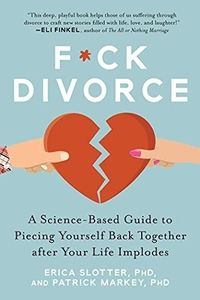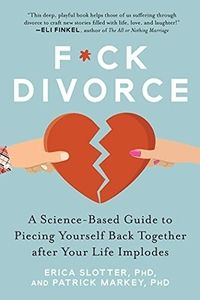
Why This Book
There are a bazillion books on divorce, but this one comes from a place that’s equal parts personal and professional expertise. In her intro, author Erica Slotter admits that when she’d received her divorce decree, two things came to mind, “One: thank God it’s over. Two: What the fuck do I do now?” As a research psychologist devoted to defining the special sauce that makes relationships last or fail, Slotter understands and embraces the laughing-through-tears irony that makes this book uniquely personal, including the succulent tidbit that her also-newly divorced colleague and fellow comisserator eventually becomes her future husband. Oh, yeah, and they wrote this book together.
The book is about gluing yourself back together when your post-divorce self resembles shattered shards on a sandy beach. Who are you? And how do you get on with things? Slotter and Markey know it’s messy, but approach it with humor and stark realism, noting they’ll also help you “try to avoid serving jail time for murdering your twat-waffle ex-spouse.” They welcome you to the world of being divorced with sturdy, open, understanding arms, though not at all sugar-coating the process: “It’s good, bad, ridiculous, and sometimes your blind date smells like cabbage.”
Uniquely, F*ck Divorce acknowledges the ugliest bits—from brushing your teeth to awkward first dates guiding through the process of finding a life partner again. The post-divorce you isn’t the same as the one when you got married. Self-care, getting along with your ex, counseling your kids: You’ll have to learn and re-learn a new way of moving forward. If the authors are leading by example, there is, eventually, a way of walking off into the sunset, but not without embracing the Winston Churchill time-tested truism: “If you’re going through hell, keep going.”
My Personal Take
I’m going on nearly two decades since I ended my short-lived marriage, and I wish this book was around back then. The eternal adage is true: In times of crisis, you learn who your friends are. Moreover, some who are your real friends simply don’t know how to give you the support you need when you need it most. While a book written by strangers is never meant to replace the compassion of your nearest and dearest (or even a great therapist), it can provide an emotional life raft when you feel you're most alone. What Slotter and Markey have done is create a realistic playbook, and, despite their professional expertise, they try to keep the jargon out of it.
And perhaps this book's biggest strength: It actually doesn’t “tell” you what to do. It’s an easy read as if you’ve sat down with a good friend, who also happens to be a skilled professional. This friend knows you’re in a vulnerable place, and also knows that because opinions are truly like assholes, everyone you’ve met and haven’t is going to have an opinion about your divorce. No matter how well-meaning, most of these opinions will feel like they were and dually weren’t meant for you. “You’ll get over it” and “you’re better off” don’t really help when you’ve been crying for two years straight. The fact is, most of us will get through it safely, Slotter and Markey know this, but it’ll be really shitty far before that, and this book is their attempt to support, sympathize, cajole and guide you through.

The Crush Letter
The Crush Letter is a weekly newsletter curated by Dish Stanley on everything love & connection - friendship, romance, self-love, sex. If you’d like to take a look at some of our best stories go to Read Us. Want the Dish?
If you love me as much as I love you (and I really do love you!), then please help me grow by forwarding this {love} Letter to a friend! And I'd love to have you join us on instagram, facebook & twitter.

